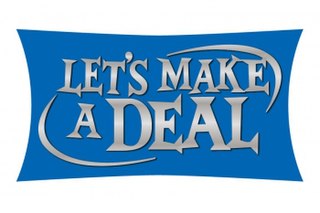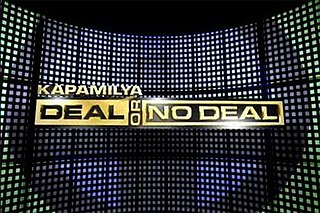
A game show is a genre of broadcast viewing entertainment where contestants compete for a reward. These programs can either be participatory or demonstrative and are typically directed by a host, sharing the rules of the program as well as commentating and narrating where necessary. The history of game shows dates back to the invention of television as a medium. On most game shows, contestants either have to answer questions or solve puzzles, typically to win either money or prizes. Game shows often reward players with prizes such as cash, trips and goods and services provided by the show's sponsor.

The Price Is Right is an American television game show where contestants compete by guessing the prices of merchandise to win cash and prizes. A 1972 revival by Bob Stewart, Mark Goodson, and Bill Todman of their 1956–1965 show of the same name, the new version added many distinctive gameplay elements. Contestants are selected from the studio audience: the announcer calls their name, invoking them to "Come on down!", the show's famous catchphrase.
Who Wants to Be a Millionaire? is an international television game show franchise of British origin, created by David Briggs, Mike Whitehill and Steven Knight. In its format, currently owned and licensed by Sony Pictures Television, contestants tackle a series of multiple-choice questions to win large cash prizes in a format that twists on many game show genre conventions – only one contestant plays at a time, similar to radio quizzes; contestants are given the question before deciding whether to answer, and have no time limit to answer questions; and the amount offered increases as they tackle questions that become increasingly difficult. The maximum cash prize offered in most versions of the format is an aspirational value in local currency, such as one million pounds in the UK or 75 million rupees in India.

Hollywood Squares is an American game show in which two contestants compete in a game of tic-tac-toe to win cash and prizes. The show piloted on NBC in 1965 and the regular series debuted in 1966 on the same network. The board for the game is a 3 × 3 vertical stack of open-faced cubes, each occupied by a celebrity seated at a desk and facing the contestants. The stars are asked questions by the host and the contestants judge the truth of their answers to gain squares in the right pattern to win the game.

Match Game is an American television panel game show that premiered on NBC in 1962 and has been revived several times over the course of the last six decades. The game features contestants trying to match answers given by celebrity panelists to fill-in-the-blank questions. Beginning with the CBS run of the 1970s, the questions are often formed as humorous double entendres.

Let's Make a Deal is a television game show that originated in the United States in 1963 and has since been produced in many countries throughout the world. The program was created and produced by Stefan Hatos and Monty Hall, the latter serving as its host for nearly 30 years.
Remote Control is a TV game show that ran on MTV for four seasons from 1987 until 1990. It was MTV's first original non-musical program and first game show. A concurrent syndicated version of the series ran during the 1989-90 season and was distributed by Viacom. Three contestants answered trivia questions on movies, music, and television, many of which were presented in skit format.
Concentration is an American television game show based on the children's memory game of the same name. It was created by Jack Barry and Dan Enright. The show featured contestants matching prizes represented by spaces on a game board, which would then reveal portions of a rebus puzzle underneath for the contestants to solve.
The Joker's Wild is an American television game show that aired at different times between 1972 and 2019. In the show, contestants answer questions based on categories determined randomly by a mechanism resembling a slot machine. The show's title refers to the game's slot-machine mechanism also having jokers.

Figure It Out is an American children's panel game show that aired on Nickelodeon. The original series, hosted by Summer Sanders, ran for four seasons from July 7, 1997, to December 12, 1999. The show was revived in 2012, with Jeff Sutphen as host, with the revival airing from June 11, 2012, to July 16, 2013. The series was originally recorded at Nickelodeon Studios at Universal Studios in Orlando, Florida. The revival episodes were filmed on stage 19 at Paramount Studios in Los Angeles.

The Sunday Night Project is a British comedy-variety show by Princess Productions that first aired on Channel 4 in February 2005 under the title The Friday Night Project. Originally broadcast on Friday nights, the show moved to Sunday nights for its seventh series in 2008.

Catchphrase is a British game show based on the short-lived American game show of the same name. It originally aired on ITV in the United Kingdom between 12 January 1986 and 23 April 2004. A revival premiered on ITV on 7 April 2013 and is still running as of 2023.
Nicholas David Weir is an English entertainer and presenter. He was the second presenter of Catchphrase and is currently the Senior Vice President of Entertainment for Royal Caribbean International. He presented four game shows for ITV productions including Catchphrase.

Who Wants to Be a Millionaire? is a British television quiz show, created by David Briggs, Steven Knight & Mike Whitehill for ITV. The programme's format sees contestants taking on multiple-choice questions based upon general knowledge, winning a cash prize for each question they answer correctly, with the amount offered increasing as they take on more difficult questions. If an incorrect answer is given, the contestant will leave with whatever cash prize is guaranteed by the last safety net they have passed, unless they opt to walk away before answering the next question with the money the cash prize they had managed to reach. To assist in the quiz, contestants are given a series of "lifelines" to help answer questions.

Who Wants to Be a Millionaire is an American television game show adapted from the same-titled British program created by David Briggs, Steven Knight and Mike Whitehill and developed for the United States by Michael Davies. The show features a quiz competition with contestants attempting to win a top prize of $1,000,000 by answering a series of multiple-choice questions, usually of increasing difficulty. The program has endured as one of the longest-running and most successful international variants in the Who Wants to Be a Millionaire? franchise.

The Price Is Right is an American game show produced by Mark Goodson-Bill Todman Productions, wherein contestants placed successive bids on merchandise prizes with the goal of bidding closest to each prize's actual retail price without surpassing it. The show was a precursor to the current and best-known version of the program, which premiered in 1972 on CBS's daytime schedule. It makes The Price Is Right one of only a few game show franchises to have aired in some form across all three of the Big Three television networks.

Kapamilya, Deal or No Deal is the Philippine franchise of Deal or No Deal, presently hosted by Luis Manzano and previously by Kris Aquino, which premiered on June 5, 2006, on ABS-CBN.

Fifteen to One is a British general knowledge quiz show broadcast on Channel 4. It originally ran from 11 January 1988 to 19 December 2003 and had a reputation for being one of the toughest quizzes on TV. Throughout the show's original run, it was presented and produced by William G. Stewart. Thousands of contestants appeared on the programme, which had very little of the chatting between host and contestants that is often a feature of other television quiz shows.

Wheel of Fortune is an American television game show created by Merv Griffin. The show has aired continuously since January 1975. It features a competition in which contestants solve word puzzles, similar to those in hangman, to win cash and prizes determined by spinning a giant carnival wheel. The current version of the series, which airs in nightly syndication, premiered on September 19, 1983. It stars Pat Sajak and Vanna White as hosts, who have hosted the nighttime version since its inception. The original version of Wheel was a network daytime series that ran on NBC from January 6, 1975, to June 30, 1989, and subsequently aired on CBS from July 17, 1989, to January 11, 1991; it returned to NBC on January 14, 1991, and was cancelled that year, ending on September 20, 1991.
Jeopardy! is an American television game show created by Merv Griffin. The show is a quiz competition that reverses the traditional question-and-answer format of many quiz shows. Rather than being given questions, contestants are instead given general knowledge clues in the form of answers and they must identify the person, place, thing, or idea that the clue describes, phrasing each response in the form of a question.














